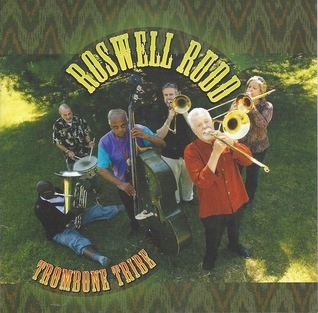Related Research Articles

Steve Lacy was an American jazz saxophonist and composer recognized as one of the important players of soprano saxophone. Coming to prominence in the 1950s as a progressive dixieland musician, Lacy went on to a long and prolific career. He worked extensively in experimental jazz and to a lesser extent in free improvisation, but Lacy's music was typically melodic and tightly-structured. Lacy also became a highly distinctive composer, with compositions often built out of little more than a single questioning phrase, repeated several times.

Jazz on a Summer's Day is a 1959 concert film set at the 1958 Newport Jazz Festival in Newport, Rhode Island. The film was directed by commercial and fashion photographer Bert Stern and Aram Avakian, who also edited the film. The Columbia Records jazz producer, George Avakian, was the musical director of the film.

Robert Edward "Bob" Brookmeyer was an American jazz valve trombonist, pianist, arranger, and composer. Born in Kansas City, Missouri, Brookmeyer first gained widespread public attention as a member of Gerry Mulligan's quartet from 1954 to 1957. He later worked with Jimmy Giuffre, before rejoining Mulligan's Concert Jazz Band. He garnered 8 Grammy Award nominations during his lifetime.

Albert Edwin Condon was an American jazz banjoist, guitarist, and bandleader. A leading figure in Chicago jazz, he also played piano and sang. He also owned a self-named night club in New York City.

Herbert Horatio Nichols was an American jazz pianist and composer who wrote the jazz standard "Lady Sings the Blues". Obscure during his lifetime, he is now highly regarded by many musicians and critics.

Willard Palmer Harris was an American jazz trombonist.

John Kenneth Davern was an American jazz clarinetist.

Roswell Hopkins Rudd Jr. was an American jazz trombonist and composer.

Michael Mantler is an Austrian avant-garde jazz trumpeter and composer of contemporary music.

Steve Swell is an American free jazz trombonist, composer, and educator.

Robert Sage Wilber was an American jazz clarinetist, saxophonist, and band leader. Although his scope covers a wide range of jazz, Wilber was a dedicated advocate of classic styles, working throughout his career to present traditional jazz pieces in a contemporary manner. He played with many distinguished jazz leaders in the 1950s and 1960s, including Bobby Hackett, Benny Goodman, Sidney Bechet, Jack Teagarden and Eddie Condon. In the late 1960s, he was an original member of the World's Greatest Jazz Band, and in the early 70s of Soprano Summit, a band which gained wide attention. In the late 1970s, he formed the Bechet Legacy Band.

Melvin Edward Alton "Turk" Murphy was an American trombonist and bandleader, who played traditional and Dixieland jazz.

Ken Filiano is an American jazz and orchestral bassist based in Brooklyn, New York.
Dick Lammi was an American jazz tubist and bassist associated with Dixieland jazz.
The World's Greatest Jazz Band was an all-star jazz ensemble active from 1968 to 1978.
Dixieland jazz, also referred to as traditional jazz, hot jazz, or simply Dixieland, is a style of jazz based on the music that developed in New Orleans at the start of the 20th century. The 1917 recordings by the Original Dixieland Jass Band, fostered awareness of this new style of music.
The Original Salty Dogs Jazz Band is a traditional jazz ensemble founded in 1947 in West Lafayette, Indiana, and later based in Chicago, Illinois. The Salty Dogs play standards and original pieces influenced by the Dixieland artists of the 1910s and 1920s, as well as the 1940s and 1950s "revivalists" such as Lu Watters and Turk Murphy.
The Castle Jazz Band was a Dixieland jazz band, part of the "West Coast revival" of traditional jazz music. Their recordings were popular worldwide for a time, although touring outside their Portland, Oregon base was limited.

Broad Strokes is an album by trombonist Roswell Rudd. It was recorded during March 1999–January 2000 at various locations, and was released by Knitting Factory Works in 2000. On the album, Rudd appears in a broad range of ensemble contexts, with varying personnel.

Trombone Tribe is an album by trombonist Roswell Rudd. It was recorded at various locations and was released in 2009 by Sunnyside Records. On the album, Rudd appears in different brass band combinations. On five tracks, Rudd appears in a sextet with trombonists Steve Swell and Deborah Weisz, tubist Bob Stewart, bassist and violinist Henry Grimes, and drummer Barry Altschul, while two tracks feature Rudd with five additional trombones plus Altschul. The remaining tracks include members of the bands Bonerama, Sexmob, and the Gangbé Brass Band of Benin.
References
- ↑ Albany Jazz on Roswell Rudd
- ↑ N Y Times
- ↑ "Jazz Times". Archived from the original on 2007-06-22. Retrieved 2007-11-25.
- ↑ "George Avakian - record innovator". Archived from the original on 2016-08-09. Retrieved 2007-11-25.
- ↑ Play it again, Bill
- ↑ "Jazz Times". Archived from the original on 2007-06-22. Retrieved 2007-11-25.